Posted by Elena del Valle on November 18, 2020
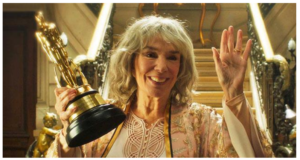
Graciela Borges is Mara in The Weasel’s Tale (El Cuento de las Comadrejas)
Photo: Outsider Pictures
The Weasel’s Tale (El cuento de las comadrejas), a new suspense film with touches of dark humor and romance, will open in United States theaters December 11, 2020. The unrated film is in Spanish with English subtitles. No video clip file was made available.
Four long-time friends sharing a stately home in Argentina find themselves the victims of an unscrupulous greedy couple seeking to con them out of their home permanently. A Spanish Argentina collaboration copyrighted 2019 the 129-minute film was directed and written by Juan José Campanella (The Secret in Their Eyes). It appears to be a remake of Los muchachos de antes no usaban arsénico, a 1976 film from Argentina by José A. Martínez Suárez.
The film was distributed by Latido in Spain and Outsider Pictures and Strand Releasing in the United States. The cast features Graciela Borges as Mara, Oscar Martínez as Norberto, Luis Brandoni as Pedro, Marcos Mundstock as Martin, Clara Lago Grau as Bárbara, and Nicolas Francella as Francisco.
Posted by Elena del Valle on October 28, 2020
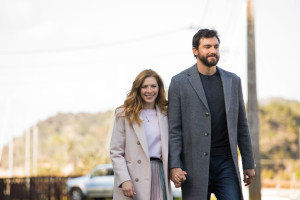
Rachelle Lefevre and Matt Whelan play a Canadian couple in The Sounds
Photo: Acorn TV
Video: South Pacific Pictures
Rachelle Lefevre and Matt Whelan play Maggie and Tom Cabbott, a Canadian couple in The Sounds, a psychological thriller from Shaftesbury in Canada and South Pacific Pictures in New Zealand. When Tom disappears, dark secrets and family plots complicate matters for Maggie. The TV miniseries is available in the United States via Acorn TV, a commercial free subscription streaming service offering foreign programing. Scroll down to watch a video trailers.
In the eight episode miniseries the happily married Canadian couple start a new life and a new salmon fishery business in a small harbor town. What starts as a promising adventure for the couple seeking to escape Tom’s oppressive family quickly spirals into an unsettling story.
“It was made for Acorn TV and CBC and Sky TV NZ,” said Rachael Keereweer, head of Communications, South Pacific Pictures. “The primary target audience here in New Zealand was a relatively broad, 25-54 demo. From idea, the show was several years in the making. The actual production schedule, including pre-production was 6 1/2 months with a shoot period of 13 weeks from mid-August to late November 2019.”
The visually stunning background scenery in The Sounds is in New Zealand. The series was filmed in Whangaroa at the top of the North Island in an area called the Bay of Islands and in Auckland.
“It’s a mystical, magical, wonderful, beautiful place,” said Lefevre about the Malborough Sounds in a series press kit. And when asked about the most enjoyable aspect of working on The Sounds Whelan said, according to the same promotional materials, “Shooting up North in Whangaroa, I’d never been there before and spending a couple of weeks out on the water, on yachts and kayaking and doing all sorts of cool things in beautiful locations around New Zealand.”
The program was created and written by Sarah-Kate Lynch (Blessed Are the Cheesemakers, The House of Daughters). Other creative staff include Peter Stebbings, director, and executive producers Kelly Martin and Sally Campbell.
South Pacific Pictures, in operation for 32 years, has produced more than 5,600 hours of drama series and serials, feature films, reality programming and documentaries for New Zealand, Australian, Canadian and United Kingdom broadcasters, according to the company website.
Shaftesbury is a Toronto based creator and producer of original content for television, film, and digital content, according to the company website. That includes 13 seasons of Murdoch Mysteries, three seasons of Frankie Drake Mysteries, three seasons of Slasher, Hudson & Rex, Departure, Dead Still, and The Sounds.
Posted by Elena del Valle on October 21, 2020

Women in Biology
Photos: Science, Naturally!
Science, Naturally! released Women in Biology (Science Naturally, $9.95), a 40-page paperback for seven to ten year olds published this month. A hardback edition was published in 2016. The eight by eight inch book by Mary Wissinger is also available in a Spanish language edition titled Las mujeres en la biología. The books were illustrated by Danielle Pioli. Both books are available in digital formats.
Featured are Maria Sibylla Merian and Hildegard of Bingen of Germany as well as Jane Cooke Wright, Linda Buck and Barbara McClintock of the United States. There is a glossary at the end.

Las mujeres en la biología
The new titles are part of the publisher’s Science Wide Open series of “scientifically accurate children’s books” with a mission to teach young kids about Chemistry, Biology, and Physics, while highlighting some of the achievements of women in those fields. The biology books are the first ones in the series available in paperback and Spanish.

Mary Wissinger, author, Women In Biology
Wissinger was born in Wisconsin where she spent most of her childhood singing, reading, and daydreaming. A former teacher, she can often be found at her standing desk in St. Louis, Missouri, writing stories to inspire “curiosity about the world and connection with others.” She is the author of the entire Science Wide Open Series: Women in Biology, Women in Chemistry, and Women in Physics.

Danielle Pioli, illustrator, Women In Biology
Pioli is an artist and illustrator from Brazil who strives to inspire others to create. She produces art, illustrations, comics, zines, poems, songs, and hypnotherapy sessions. She is the illustrator of the entire Science Wide Open Series.
Science, Naturally! is Washington, D.C.-based independent press “committed to increasing science and math literacy by exploring and demystifying these topics in entertaining and enlightening ways.” The company uses fictional and nonfictional forms, diverse characters, and engaging formats to make intimidating subjects intriguing and accessible.
Comments:
Filed Under: Books
Posted by Elena del Valle on October 13, 2020
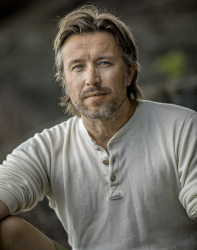
Torbjørn Ekelund, author, In Praise of Paths
Photo: Jørn H.Moen (2017)
A podcast interview with Torbjørn Ekelund, author, In Praise of Paths Walking Through Time and Nature, is available in the Podcast Section of Hispanic Marketing and Public Relations, HispanicMPR.com. During the podcast, he discusses the benefits of walking with Elena del Valle, host of the HispanicMPR.com podcast.
Torbjørn is co-founder of Harvest, an online magazine documenting wilderness adventures, environmental issues, and our relationship with nature. He lives in Oslo, Norway.
To listen to the interview, scroll down and click on the play button below. You can listen to it in the box marked “Podcast” on the right hand side. Select “HMPR Torbjørn Ekelund” and or download the MP3 file to your iPod or MP3 player to listen on the go, in your car or at home. You can also find it on the RSS feed. Some software will not allow flash, which may be necessary for the play button and podcast player. If that is your case, you will need to download the file to play it. To download it, click on the arrow of the recording you wish to copy and save it to disk. The podcast will remain listed in the October 2020 section of the podcast archive.
Posted by Elena del Valle on October 6, 2020
By Linville M. Meadows, M.D., author, A Spiritual Pathway To Recovery
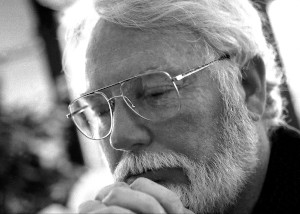
Linville M. Meadows, M.D., author, A Spiritual Pathway To Recovery
Photo: Linville M. Meadows
Addiction is a truly universal illness. It spares no demographic, cutting across all social boundaries: income, gender, ethnic background, age, and occupation. It can afflict an upper level executive, a physician or lawyer, a ditch-digger or a sales clerk. Substance abuse is found in every part of the world, with a prevalence of about ten percent. If you’re sitting at a meeting of sixty people, it’s likely that six are afflicted by addiction in one form or another.
When sober, addicts are wonderful people: kind, generous, and thoughtful. They are intelligent, hard-working, and creative. But when drunk or stoned, they become unreliable, dishonest, even mean. You will remember Dr. Jekyll, who injected himself with cocaine, unleashing the perfectly terrible and homicidal Mr. Hyde. Click to read the entire Guest Article: Understanding Addiction in the Workplace
Posted by Elena del Valle on September 29, 2020

Jenni Lehtimäki, Ph.D., senior researcher, Finnish Environment Institute
Photo: Antti Leskinen
A podcast interview with Jenni Lehtimäki, Ph.D., senior researcher, Finnish Environment Institute, is available in the Podcast Section of Hispanic Marketing and Public Relations, HispanicMPR.com. During the podcast, she discusses skin micribiota with Elena del Valle, host of the HispanicMPR.com podcast.
Jenni is an ecologist and evolutionary biologist who studies ecosystem in human bodies, microbiota. She is especially interested in the role of green environments in supporting this ecosystem. She received her graduate degree from the Faculty of Environmental and Biological Sciences, University of Helsinki, Finland in 2017. She has tested the biodiversity hypothesis of health, which states that two global megatrends, i.e. decreasing biological diversity and increasing prevalence of non-communicable diseases, are related. The potential link between these megatrends is the limited exposure to environmental, beneficial microbes, which do not thrive in urbanized and westernized areas.
She has worked on these research questions at the faculty of medicine at the University of Helsinki, Finland and at the clinical research unit Copenhagen Prospective Studies On Asthma in Childhood (COPSAC) in Copenhagen, Denmark. Currently her focus is on the role of biological diversity on human health.
To listen to the interview, scroll down and click on the play button below. You can also listen by looking for “Podcast” on the right hand side, then select “HMPR Jenni Lehtimäki, Ph.D.” and or download the MP3 file to your iPod or MP3 player to listen on the go, in your car or at home. You can also find it on the RSS feed. Some software will not allow flash, which may be necessary for the play button and podcast player. If that is your case, you will need to download the file to play it. To download it, click on the arrow of the recording you wish to copy and save it to disk. The podcast will remain listed in the September 2020 section of the podcast archive.
Posted by Elena del Valle on September 24, 2020
By Joy Gendusa
Owner, PostcardMania
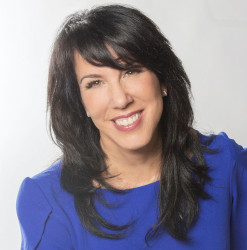
Joy Gendusa, owner, PostcardMania
Photo: PostcardMania
In this new pandemic age, many businesses felt the impact of COVID-19 in a major way, including my own, PostcardMania. The first wave of mandated closures wreaked havoc on our bottom line, dealing a massive 41 percent hit to weekly revenue earnings. Instead of sitting around waiting for our luck to change, however, we took several pivotal actions that allowed us to rebound to pre-crash numbers and have the best summer in our 22-year history.
The first thing we did was look around at all the coronavirus information overflow and say, “Holy smokes, we need to help our clients filter this and find relevant information.” (Small businesses are our primary clientele.) Small businesses were hugely impacted by the pandemic panic and mandatory shutdowns, and we wanted to help them find information that would help them stay afloat and maybe even thrive during period in history. Click to read the entire Guest Article: Covid-19 Marketing Idea: $117,514.21 Generated from Email Marketing
Posted by Elena del Valle on September 17, 2020

Light and Space
Photo, video: KECT
For serious art lovers California PBS station KCET will premier the eleventh season of Artbound at 9 p.m. P.T. Wednesday September 30. The hour long program featuring three artists and their work will focus on The Light and Space movement of a group of artists in California in the 1960s who explored minimalism with attention to the interaction of light and space. The materials the artists relied on to create their “perceptual experiences,” such as polyurethane, fiberglass and plastics, emerged from the postwar aerospace industry. The artists are Robert Irwin, Larry Bell, and Helen Pashgian. Primary production was December 2019 to February 2020. Scroll down to watch a video preview.
Artbound is an Emmy award-winning arts and culture series that examines the lives and works of arts of culture innovators, especially those making an impact in Southern California. The first episode will air again at 8 p.m. P.T. on Friday October 2 on PBS SoCal and at 10 p.m. E.T./P.T. Tuesday October 6 on Link TV (DirecTV channel 375 / Dish Network channel 9410). The episodes should also be available for online streaming following their initial broadcast on kcet.org/artbound, pbssocal.org/artbound and linktv.org/artbound as well as on Amazon, YouTube, Roku, Apple TV and the free PBS App.
Video
Posted by Elena del Valle on August 24, 2020

Bel Hernandez Castillo, CEO, Latin Heat Media

Naibe Reynoso, founder, Con Todo Press
Photos: Laura Sixtos, Naibe Reynoso
A podcast interview with Bel Hernandez Castillo, CEO, Latin Heat Media and Naibe Reynoso, founder, Con Todo Press is available in the Podcast Section of Hispanic Marketing and Public Relations, HispanicMPR.com. We discuss entrepreneurship among Latinas.
Bel has over twenty-five years in the entertainment industry, first as an actress then transitioning into entertainment media, as founder the first entertainment trade publication focused on Latinos in Hollywood, Latin Heat Entertainment. She also owns a production company and a streaming platform. As producer she co-created, executive produced, and hosted three TV talk shows; currently TheTrendTalk, a talk show which highlight Latinos, airs on the METV’s network (KAZA in Los Angeles).
Naibe is a Mexican-American Multi-Emmy award-winning journalist based in Los Angeles California. She authored Be Bold, Be Brave: 11 Latinas who made U.S. History, a children’s book. She has worked and contributed to various regional, national and international networks including KTLA, France 24, Univision Network, Reelz Channel, CNN en Español, the Biography Channel, Fox News Latino, Larry King’s ORA TV, and filled in as a co-host on ABC’s The View. She also co-created The TrendTalk, a one-hour talk show and co-founded the events company Latinafest LLC which has produced over a dozen successful events in the Los Angeles Area.
To listen to the interview, scroll down and click on the play button below or locate the “Podcast” section on the right hand side, then choose “HMPR Bel Hernandez, Naibe Reynoso” or download the MP3 file to your iPod or MP3 player to listen on the go, in your car or at home from the RSS feed. Some software will not allow flash, which may be necessary for the podcast player. If that is your case, you will need to download the file to play it. To download it, click on the arrow of the recording you wish to copy and save it to disk. The podcast will remain listed in the August 2020 section of the podcast archive.
Posted by Elena del Valle on August 19, 2020
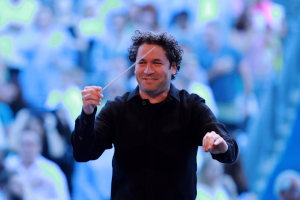
Gustavo Dudamel, host of the new series In Concert at the Hollywood Bowl
Photo, video: Adam Latham, KCET, Los Angeles Philharmonic Association
Southern California station KCET and the Los Angeles Philharmonic Association (LA Phil) will offer In Concert at the Hollywood Bowl, a six episode series of performances from the past 10 years. Hosted by Gustavo Dudamel, music and artistic director of the Philharmonic, the series will launch Wednesday, August 19, 2020 at 9 p.m. P.T. on KCET with Hecho in Mexico (Made in Mexico). It is scheduled to be broadcast on PBS stations around the country in early 2021, according to a press release. Scroll down to watch a video.
Hecho en Mexico features Dudamel and the LA Phil, Rodrigo y Gabriela, Natalia Lafourcade, Los Angeles Azules, YOLA (Youth Orchestra Los Angeles), and La Santa Cecilia. Gustavo and Friends is scheduled to air a week later at the same time featuring Dudamel, LA Phil, Misty Copeland, Pablo Ferrández, Amanda Majeski, J’Nai Bridges, Issachah Savage, Ryan Speedo Green, and the Los Angeles Master Chorale (LAMC).
On September 2 at 9 p.m the series will feature Jazz at the Hollywood Bowl Featuring Dianne Reeves with Ivan Lins, Christian McBride, Chucho Valdes, Cecile McLorin Salvant, Kamasi Washington and Mega Nova (Herbie Hancock, Carlos Santana and Wayne Shorter). Musicals and the Movies is scheduled for the following Wednesday featuring Dudamel, LA Phil, Kristin Chenoweth with Kevin Stites Audra McDonald with Bramwell Tovey, and Sutton Foster with Brian Stokes Mitchell.
Música Sin Fronteras (Music Without Borders) is scheduled to air Wednesday September 16 at 9 p.m. P.T. to celebrate Hispanic Heritage Month with Scully, Dudamel and LA Phil, Carlos Vives, Café Tacvba, Siudy Garrido Flamenco Dance Theater, and Paolo Bortolameolli. Fireworks! is scheduled for the following Wednesday at the same time featuring Katy Perry, Pink Martini, Thomas Wilkins, Nile Rodgers & Chic, Diego El Cigala, Dudamel and LA Phil, and John Williams.
With a seating capacity of nearly 18,000, the Hollywood Bowl is among the largest natural amphitheaters in the world. KCET, a content channel of the Public Media Group of Southern California, is a donor-supported community institution, according to press materials. The Los Angeles Philharmonic Association presents live performances of orchestral, pop, rock, country, jazz, blues, Latin, world music, opera, chamber, Baroque, organ and celebrity recitals, theatrical performances, explorations of film music, dance, comedy, and multimedia productions.























